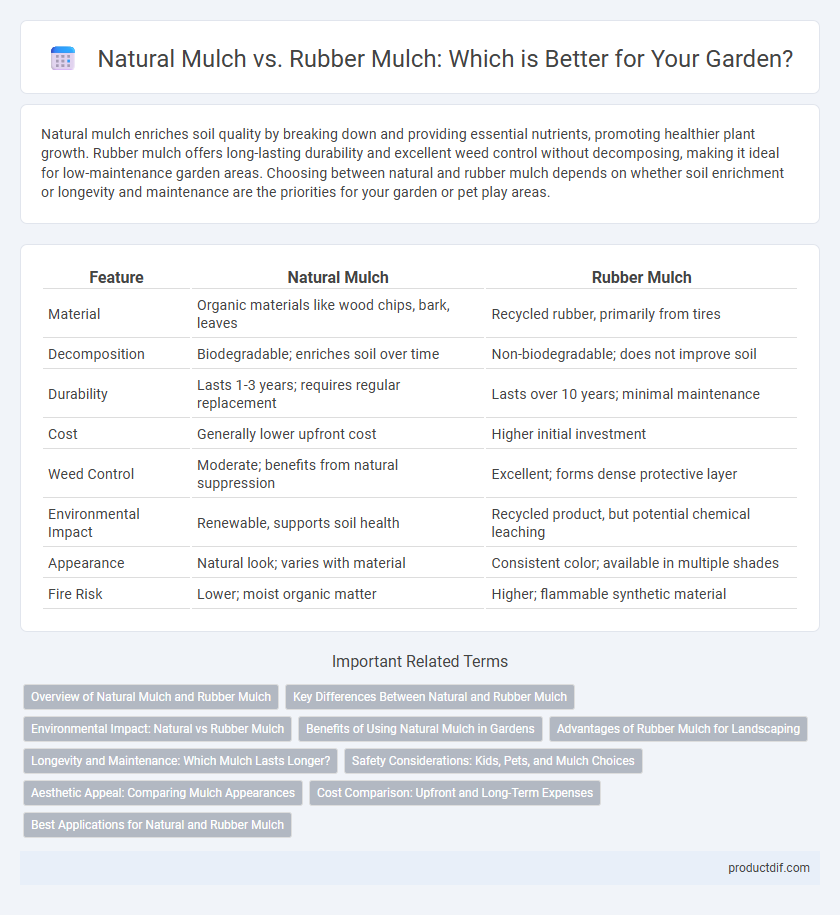Natural mulch enriches soil quality by breaking down and providing essential nutrients, promoting healthier plant growth. Rubber mulch offers long-lasting durability and excellent weed control without decomposing, making it ideal for low-maintenance garden areas. Choosing between natural and rubber mulch depends on whether soil enrichment or longevity and maintenance are the priorities for your garden or pet play areas.
Table of Comparison
| Feature | Natural Mulch | Rubber Mulch |
|---|---|---|
| Material | Organic materials like wood chips, bark, leaves | Recycled rubber, primarily from tires |
| Decomposition | Biodegradable; enriches soil over time | Non-biodegradable; does not improve soil |
| Durability | Lasts 1-3 years; requires regular replacement | Lasts over 10 years; minimal maintenance |
| Cost | Generally lower upfront cost | Higher initial investment |
| Weed Control | Moderate; benefits from natural suppression | Excellent; forms dense protective layer |
| Environmental Impact | Renewable, supports soil health | Recycled product, but potential chemical leaching |
| Appearance | Natural look; varies with material | Consistent color; available in multiple shades |
| Fire Risk | Lower; moist organic matter | Higher; flammable synthetic material |
Overview of Natural Mulch and Rubber Mulch
Natural mulch, derived from organic materials such as wood chips, bark, and leaves, enhances soil fertility by decomposing and enriching the soil with essential nutrients. Rubber mulch, made from recycled tires, provides long-lasting ground cover that resists decomposition, reduces erosion, and improves water retention without altering soil chemistry. Both mulches serve to suppress weeds and regulate soil temperature, but natural mulch offers ecological benefits through biodegradability, whereas rubber mulch offers durability and low maintenance.
Key Differences Between Natural and Rubber Mulch
Natural mulch, composed of organic materials like wood chips, leaves, and bark, improves soil health by decomposing and adding nutrients, while rubber mulch, made from recycled tires, does not break down and therefore does not enrich the soil. Natural mulch retains moisture efficiently and regulates soil temperature but requires periodic replacement as it decomposes, whereas rubber mulch offers long-lasting weed control and resists decay without needing frequent replenishment. Environmental impact also differs; natural mulch is biodegradable and supports microbial life, whereas rubber mulch can leach chemicals and contribute to microplastic pollution.
Environmental Impact: Natural vs Rubber Mulch
Natural mulch decomposes over time, enriching soil with organic matter and promoting microbial activity, which enhances soil health and reduces landfill waste. Rubber mulch, made from recycled tires, does not biodegrade and can leach chemicals into the soil, potentially harming plant life and groundwater quality. Choosing natural mulch supports sustainable gardening by minimizing environmental pollutants and fostering a healthier ecosystem.
Benefits of Using Natural Mulch in Gardens
Natural mulch improves soil fertility by decomposing and enriching the soil with essential nutrients, promoting healthier plant growth. It enhances moisture retention and temperature regulation, reducing water needs and protecting roots from extreme temperatures. Natural mulch also supports beneficial soil organisms, fostering a balanced ecosystem crucial for sustainable garden health.
Advantages of Rubber Mulch for Landscaping
Rubber mulch offers superior durability and long-lasting color retention compared to natural mulch, reducing the need for frequent replacement. Its excellent drainage properties prevent waterlogging and inhibit mold growth, promoting healthier plant roots. Furthermore, rubber mulch provides effective weed control and enhanced impact absorption, making it ideal for playgrounds and high-traffic garden areas.
Longevity and Maintenance: Which Mulch Lasts Longer?
Natural mulch, composed of organic materials like wood chips or bark, typically lasts for about one to two years before it decomposes and needs replenishing, contributing nutrients to the soil. Rubber mulch, made from recycled tires, can last up to ten years without significant breakdown, offering a durable and low-maintenance alternative. Choosing rubber mulch reduces the frequency of replacement and maintenance, but it lacks the soil-enriching benefits of natural mulch.
Safety Considerations: Kids, Pets, and Mulch Choices
Natural mulch, such as wood chips or bark, is biodegradable and generally safer for kids and pets due to its non-toxic properties and lower risk of ingestion hazards. Rubber mulch, made from recycled tires, offers excellent durability and cushioning but may pose chemical exposure risks and potential choking hazards for small children and animals. Choosing the right mulch requires weighing safety factors, including toxicity, ingestion risks, and the suitability for active play areas where kids and pets frequent.
Aesthetic Appeal: Comparing Mulch Appearances
Natural mulch offers a rich, organic look with earthy tones that enhance garden aesthetics by blending seamlessly with plants and soil. Rubber mulch provides a more uniform appearance with vibrant colors, maintaining its hue longer without fading or decomposing. Choosing between natural and rubber mulch depends on desired visual consistency and garden style, balancing natural charm with long-lasting color vibrancy.
Cost Comparison: Upfront and Long-Term Expenses
Natural mulch typically has a lower upfront cost, averaging $20 to $40 per cubic yard, while rubber mulch costs between $50 to $100 per cubic yard. Over time, natural mulch decomposes and requires replenishing every 1 to 2 years, increasing long-term expenses, whereas rubber mulch's durability reduces replacement frequency, making it more cost-effective in the long run. Considering maintenance and longevity, rubber mulch often provides better value despite higher initial investment.
Best Applications for Natural and Rubber Mulch
Natural mulch, such as wood chips and bark, excels in improving soil health by retaining moisture and enriching organic content, making it ideal for vegetable gardens, flower beds, and areas requiring nutrient cycling. Rubber mulch, made from recycled tires, offers superior durability and excellent weed suppression, making it best suited for playgrounds, pathways, and landscapes where long-lasting ground cover and minimal maintenance are priorities. Choosing the right mulch depends on the specific gardening needs: natural mulch supports plant growth through decomposition, while rubber mulch provides aesthetic appeal and longevity without breaking down.
Natural mulch vs Rubber mulch Infographic

 productdif.com
productdif.com